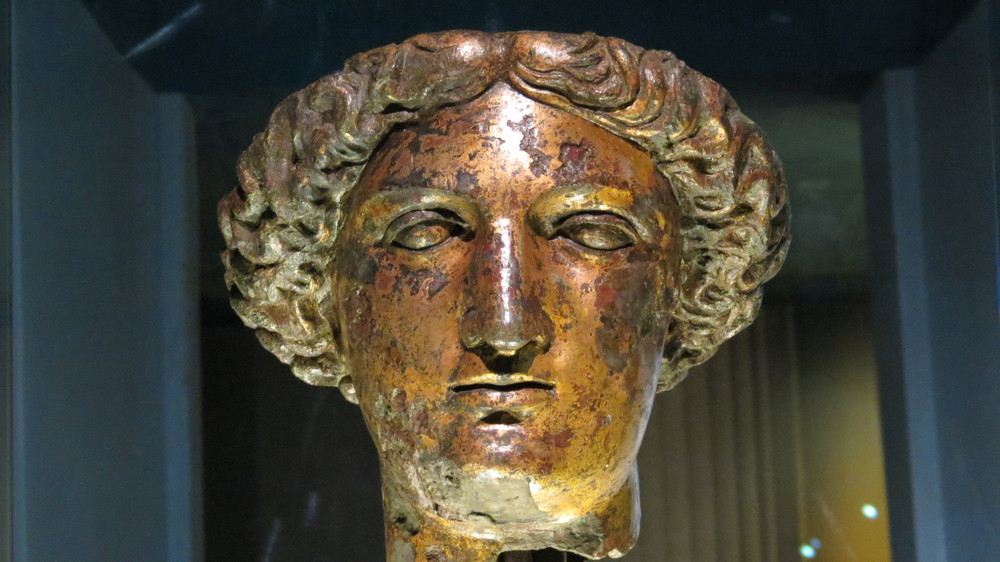RS30: The Second Coming?
A: I’d like to return, if we could, to the idea of a “genderless divine essence.” You’ve pointed out in our discussions that the apostle Paul had an understanding of God which blended both Jewish Essene beliefs and Hellenistic philosophical beliefs — especially Plato’s teachings. So somehow Paul ends up with an understanding of the Divine where there’s both a genderless divine essence — Spirit (pneuma in the Greek) — and a male God. How can Paul’s God be both male and genderless?
J: Plato had this strange mix, too. Would it help if I told you Plato was also a member of the Seekers of the Rock? That both Plato and Paul worked for the same organization?

Plato’s Cave? Is this really a helpful metaphor for understanding life on Planet Earth? (photo (c) Image*After)
A: Plato wrote his books over 400 years before Paul wrote his.
J: Yes. The Seekers of the Rock have a long history. Which is no surprise when you look at the history of other religious movements. When Plato wrote, his job was to try to pull Greek thought in the direction of the Seekers’ own agenda. When Paul wrote, his job was to try to pull Hellenistic thought (which included Jewish influence) in the direction of the Seekers’ own agenda. The heavy influence of Platonism, Middle Platonism, and Neo-Platonism on Christian theology is no accident.
A: One thing I noticed when I read Plato’s works for my Master’s thesis is the infuriating blend of monism with dualism. It’s, like, make up your mind, buddy! Are we “all One” or are we split between dualistic poles of “good and evil”? How can it be both at the same time? I know we’ve talked about this before, but I still find it exasperating.
J: Gnosticism in all its forms is an attempt to reconcile the inherent conflict between monism and dualism. Paul was a proto-Gnostic thinker, in the language of recent scholarship. In many ways, the raging debates about Gnostic heresies in the early centuries of the church were fights between Paul’s own “Platonic” brand of Gnosticism and the more floridly mystical brands of Gnosticism that sprang up from Paul’s and John’s teachings. Both brands — the orthodox Pauline position and the Gnostic heresies — were attempts to explain how we can all “be One” and at the same time be forced to deal with the problem of evil in the world.
Anybody who starts with the idea that we are “all One” — the idea that each soul is a fragment of the Oneness, a fragment that’s seeking union and blissful dissolution in the cloud of knowing/unknowing — will be forced, logically speaking, into the dualistic position. Otherwise how do you logically explain why you and your neighbour aren’t the same? How do you explain why men and women are different from each other in many ways? How do you explain evil and injustice and wars of oppression? If you insist on maintaining the monistic position of Oneness, nothing in the world makes sense. Nothing.
A: Yet Paul’s group — the Seekers of the Rock — have continued to hold onto this position all this time. When are they going to get the idea they’re wrong?
J: Not any time soon. They think they’re saving the world from the evil forces of chaos, etcetera, etcetera.
A: So is this supreme cloud of knowing/unknowing the same thing as Paul’s Spirit, Paul’s “genderless divine essence”?
J: Well, they would be the same in the ideal universe (Plato’s realm of perfect Forms). In the ideal universe (the healed and restored universe which Paul and the Seekers believed they were rebuilding) all the lost and broken bits of Oneness would return to their rightful places in the “region above the heavens,” as Plato described it in Phaedrus. According to Plato and the other Seekers, this is the region where the One True God lives, “being which really is, which is without colour or shape, intangible, observable by the steersman of the soul alone, by intellect, and to which the class of true knowledge relates.”*
A: I can see from this description that the Seekers’ One True God is very big and bland and boring, kinda like a featureless cloud of hydrogen and helium atoms somewhere out in space. But Plato doesn’t actually say that this “being which really is” is genderless. So is the One True God of Paul and Plato genderless? Or is this Oneness male?
J (smiling): The One True God is male. In fact, he’s the perfect male. The Ideal Male. The Pure Male. The Form of Perfection. The Geometric Form of Order. The template for Oneness. Ultimate Knowledge. Omnipotent Mind. Creation without Chaos. The Source where the apophatic path and the anagogic path become the Perfect Circle outside time and space. The Womb where only pure Truth can be brought forth. The Mirror of Justice. All emotion is eradicated. Love, trust, and forgiveness become meaningless concepts, as meaningless as talking about rain in a village that has only known drought, desert, and harshness. The feminine principle is not so much abolished as swallowed — swallowed and controlled and assimilated — so that all impulses serve the unified purposes of the One. A lot like the Borg on Star Trek, only with a hive king instead a hive queen.
A: And this is their idea of science?
J: Yes. For them it’s the perfect combination of science and religion.
A: The part about the supremacy of the mind sounds a lot like Deism.
J: Yes.
A: Yes? It’s Deism? The Seekers of the Rock were — are — Deists?
J: Yup.
A: No wonder these guys seem so arrogant. They actually believe they can control the Law of Cause and Effect because God set it up that way for them! God set up the universe then walked away from it, so “the best and brightest” human minds can do whatever they want!
J: Yup.
A: And God can’t — won’t — intervene. Except for that one time when he apparently sent his only son through the barrier of time and space to anchor that big ol’ pyramid thing. Except you really screwed it up, according to Paul.
J: According to Paul.
A: So now they’re waiting for the next small window of time and space when the Logos can once again squeeze through from that higher realm to bring the Truth and reward them for their piety and hard work. Right?
J: You got it.
A: And when will this next window take place? When will the Second Coming happen?
J: Never. It ain’t gonna happen — not the way think people think it’s gonna happen, anyway. Same as the First Coming never happened the way Paul said it did. It’s a myth, a lie, a way to hide the truth about God the Mother and God the Father and all the ways they share their Divine Love and forgiveness with us each day whether we ask for it or not.
A: What about all the prophecies? What about the promises in the Bible and other sacred texts about chosen saviours and messiahs and prophets who’ll be coming soon to bring us revelation and salvation? Millions of people rely on the promises of prophecy for their sense of hope.
J (shrugging): Sorry. Can’t help. The kind of hope promised by Paul isn’t what angels mean by hope. For us, hope means working together with God in trust and free will and healing and forgiveness. Hope believes in the potential of all human beings to be their best selves regardless of what sacred texts say. Hope believes in the power of transformation and change when people accept their own courage and their own inner strengths. Hope is about the present, about seeing the ever-present Birth of Divine Love hiding quietly within each moment and each choice in the currents of Creation.
A: So no End-of-Times. No Judgment Day. No coming-in-clouds-with-great-power-and-glory Second Coming. The prophecies are wrong.
J: Yup. Prophecy’s a real bitch, eh?
* From the translation by Christopher Rowe of Plato’s Phaedrus (London and New York: Penguin, 2005).













